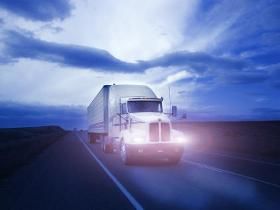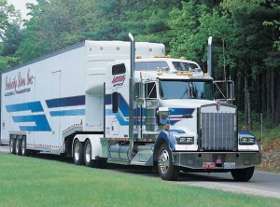Roehl Refrigerated
Topic 11832 | Page 2
I just completed my OTR training with Roehl. I test out for my truck tomorrow. So far i have no complaints with this company. Their phase one training was top notch and my OTR trainer was really great. I am not driving reefer however. I'm on the Georgia Pacific dry van fleet. As for the companies that will give you a job right out of school, Roehl is the top company in my opinion.
OTR:
Over The Road
OTR driving normally means you'll be hauling freight to various customers throughout your company's hauling region. It often entails being gone from home for two to three weeks at a time.
Dry Van:
A trailer or truck that that requires no special attention, such as refrigeration, that hauls regular palletted, boxed, or floor-loaded freight. The most common type of trailer in trucking.Reefer:
A refrigerated trailer.

That's encouraging news. I'm scheduled for Roehl orientation Dec 28th in Atlanta.

I have orientation in Marshfield on the 28th.
I saw both of those terminals this week for the first time. They are both nice. I'm currently at the Gary,Indiana terminal. Which in my opinion is the nicest one, but its also the busiest. I did my phase 1 training in Appleton though. You will learn a lot of new stuff.
Terminal:
A facility where trucking companies operate out of, or their "home base" if you will. A lot of major companies have multiple terminals around the country which usually consist of the main office building, a drop lot for trailers, and sometimes a repair shop and wash facilities.
HOS:
Hours Of Service
HOS refers to the logbook hours of service regulations.
I was originally scheduled for orientation in Grand Prairie TX but they didn't have enough starting locally so it's off to Atlanta. How do you like your truck?

So my recruiter told me today if I chose the midwest regional I can keep my own truck vs. slip seating with the 7/4 7/3. $0.01 less a mile but won't have to drive hour to terminal.
Now I don't know what to do. Worried about miles with regional.
Terminal:
A facility where trucking companies operate out of, or their "home base" if you will. A lot of major companies have multiple terminals around the country which usually consist of the main office building, a drop lot for trailers, and sometimes a repair shop and wash facilities.
Regional:
Regional Route
Usually refers to a driver hauling freight within one particular region of the country. You might be in the "Southeast Regional Division" or "Midwest Regional". Regional route drivers often get home on the weekends which is one of the main appeals for this type of route.
HOS:
Hours Of Service
HOS refers to the logbook hours of service regulations.
I'm going to try Texas regional to start with, home every week end for the 34 hour reset. I considered the slip seat options but I'd rather have my own truck.
Regional:
Regional Route
Usually refers to a driver hauling freight within one particular region of the country. You might be in the "Southeast Regional Division" or "Midwest Regional". Regional route drivers often get home on the weekends which is one of the main appeals for this type of route.

Im getting set up to go Roehl as well. Trying for 4 Jan in Phoenix. Flatbed division.
I choose them cause I have seen very little bad posted about them. No company is perfect, but for a large company they very little negative press out there. Most of what I did see was years ago. And I'm going flatbed to help eliminate the possibility of having a OTR trainer like my last one. There was no way this guy was going to be doing any tarping..... They have a 14/7 fleet here that I was going for. I was told I will have to start in the national fleet 11-14/3 to start with. For maybe about 45k miles. Also my recruiter said the do run APU's. She is a recruiter so we will see. I also have no idea what the difference is between APU's and EPU's. If there even is one.
So yeah this is my second attempt. My first attempt (with another company) went very wrong and only lasted 3 days. So I have to say I'm a bit nervous now that everything is getting back in the works again.
OTR:
Over The Road
OTR driving normally means you'll be hauling freight to various customers throughout your company's hauling region. It often entails being gone from home for two to three weeks at a time.
OOS:
When a violation by either a driver or company is confirmed, an out-of-service order removes either the driver or the vehicle from the roadway until the violation is corrected.
APU:
Auxiliary Power Unit
On tractor trailers, and APU is a small diesel engine that powers a heat and air conditioning unit while charging the truck's main batteries at the same time. This allows the driver to remain comfortable in the cab and have access to electric power without running the main truck engine.
Having an APU helps save money in fuel costs and saves wear and tear on the main engine, though they tend to be expensive to install and maintain. Therefore only a very small percentage of the trucks on the road today come equipped with an APU.

APU's:
Auxiliary Power Unit
On tractor trailers, and APU is a small diesel engine that powers a heat and air conditioning unit while charging the truck's main batteries at the same time. This allows the driver to remain comfortable in the cab and have access to electric power without running the main truck engine.
Having an APU helps save money in fuel costs and saves wear and tear on the main engine, though they tend to be expensive to install and maintain. Therefore only a very small percentage of the trucks on the road today come equipped with an APU.

EPU:
Electric Auxiliary Power Units
Electric APUs have started gaining acceptance. These electric APUs use battery packs instead of the diesel engine on traditional APUs as a source of power. The APU's battery pack is charged when the truck is in motion. When the truck is idle, the stored energy in the battery pack is then used to power an air conditioner, heater, and other devices
Epu's:
Electric Auxiliary Power Units
Electric APUs have started gaining acceptance. These electric APUs use battery packs instead of the diesel engine on traditional APUs as a source of power. The APU's battery pack is charged when the truck is in motion. When the truck is idle, the stored energy in the battery pack is then used to power an air conditioner, heater, and other devices

An APU is a small diesel generator to run AC etc without having to run the truck engine. An EPU does the same thing but is an extra set of batteries. With an EPU the engine has an auto stop/start function to recharge the batteries if they get too low. My understanding is that Roehl has EPUs.
APU:
Auxiliary Power Unit
On tractor trailers, and APU is a small diesel engine that powers a heat and air conditioning unit while charging the truck's main batteries at the same time. This allows the driver to remain comfortable in the cab and have access to electric power without running the main truck engine.
Having an APU helps save money in fuel costs and saves wear and tear on the main engine, though they tend to be expensive to install and maintain. Therefore only a very small percentage of the trucks on the road today come equipped with an APU.

EPU:
Electric Auxiliary Power Units
Electric APUs have started gaining acceptance. These electric APUs use battery packs instead of the diesel engine on traditional APUs as a source of power. The APU's battery pack is charged when the truck is in motion. When the truck is idle, the stored energy in the battery pack is then used to power an air conditioner, heater, and other devices
Epus:
Electric Auxiliary Power Units
Electric APUs have started gaining acceptance. These electric APUs use battery packs instead of the diesel engine on traditional APUs as a source of power. The APU's battery pack is charged when the truck is in motion. When the truck is idle, the stored energy in the battery pack is then used to power an air conditioner, heater, and other devices
New Reply:
New! Check out our help videos for a better understanding of our forum features

















Preview:
This topic has the following tags:
Roehl Transport Choosing A Trucking Company Truck Equipment







 TT On Facebook
TT On Facebook
Dairyland fleet? do they haul milk?